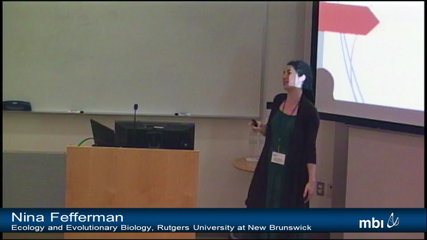MBI Videos
Nina Fefferman
-
 Nina FeffermanAs social insects have evolved division of labor and colony organization to accomplish tasks necessary to their survival, their social and collaborative environment should make them more and more susceptible to risk from infectious disease. Since they haven't been forced to extinction yet, they're clearly doing something right. Some have evolved individual physiological protections, others have behaviorally mediated individual responses/defenses, and a few have been shown to have collaborative behavioral defenses. In this talk, we'll discuss a set of models that explore whether or not the entire social organization of colonies themselves shows evidence of evolutionary selective pressures from disesase risks.
Nina FeffermanAs social insects have evolved division of labor and colony organization to accomplish tasks necessary to their survival, their social and collaborative environment should make them more and more susceptible to risk from infectious disease. Since they haven't been forced to extinction yet, they're clearly doing something right. Some have evolved individual physiological protections, others have behaviorally mediated individual responses/defenses, and a few have been shown to have collaborative behavioral defenses. In this talk, we'll discuss a set of models that explore whether or not the entire social organization of colonies themselves shows evidence of evolutionary selective pressures from disesase risks. -
 Nina FeffermanNetwork analyses have revolutionized the study of social behavior in animal populations, but have been predominantly focused on describing the social actions/decisions/behaviors in currently existing populations. In this talk, I will discuss a series of simulation studies that show how efficient group organizational structure can emerge from individual selfish choices, even when the desired metric of global efficiency is something beyond the capability of any one individual to evaluate. I’ll show how these results complement standard game theoretic discussions of the evolution of cooperation (including ‘defecting’) to allow us to study evolutionary selection on group task efficiency in already-social species. These results have direct implications for the evolution of social systems and (hopefully) provide some intriguing potential mechanisms for general feedback control on global network outcomes.
Nina FeffermanNetwork analyses have revolutionized the study of social behavior in animal populations, but have been predominantly focused on describing the social actions/decisions/behaviors in currently existing populations. In this talk, I will discuss a series of simulation studies that show how efficient group organizational structure can emerge from individual selfish choices, even when the desired metric of global efficiency is something beyond the capability of any one individual to evaluate. I’ll show how these results complement standard game theoretic discussions of the evolution of cooperation (including ‘defecting’) to allow us to study evolutionary selection on group task efficiency in already-social species. These results have direct implications for the evolution of social systems and (hopefully) provide some intriguing potential mechanisms for general feedback control on global network outcomes.
